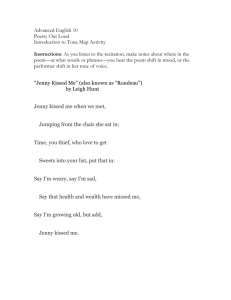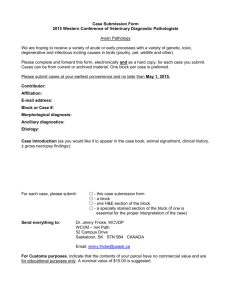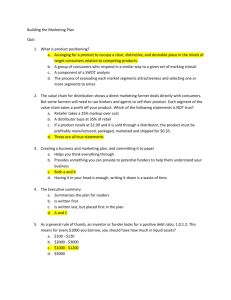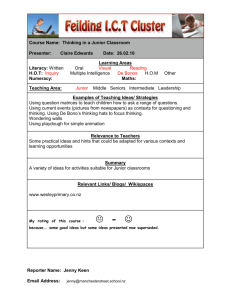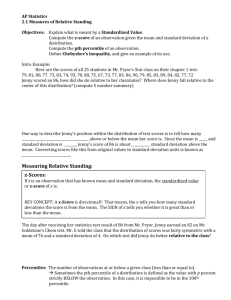COMPANY LAW
advertisement
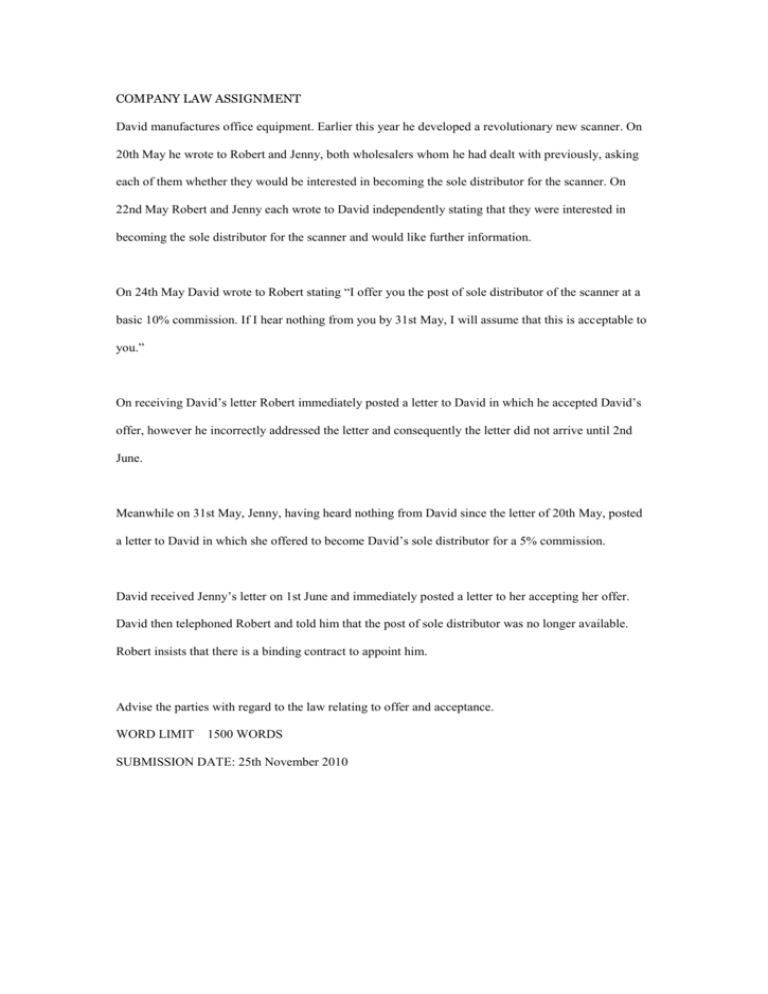
COMPANY LAW ASSIGNMENT David manufactures office equipment. Earlier this year he developed a revolutionary new scanner. On 20th May he wrote to Robert and Jenny, both wholesalers whom he had dealt with previously, asking each of them whether they would be interested in becoming the sole distributor for the scanner. On 22nd May Robert and Jenny each wrote to David independently stating that they were interested in becoming the sole distributor for the scanner and would like further information. On 24th May David wrote to Robert stating “I offer you the post of sole distributor of the scanner at a basic 10% commission. If I hear nothing from you by 31st May, I will assume that this is acceptable to you.” On receiving David’s letter Robert immediately posted a letter to David in which he accepted David’s offer, however he incorrectly addressed the letter and consequently the letter did not arrive until 2nd June. Meanwhile on 31st May, Jenny, having heard nothing from David since the letter of 20th May, posted a letter to David in which she offered to become David’s sole distributor for a 5% commission. David received Jenny’s letter on 1st June and immediately posted a letter to her accepting her offer. David then telephoned Robert and told him that the post of sole distributor was no longer available. Robert insists that there is a binding contract to appoint him. Advise the parties with regard to the law relating to offer and acceptance. WORD LIMIT 1500 WORDS SUBMISSION DATE: 25th November 2010 You should consider the following in relation to your coursework for this module: Conciseness: particularly relevance. Do not spend so long setting the background, that you never get round to answering the question. Always ask yourself how and whether what you are writing helps you answer the question Clarity: layout and structure Completeness: most important – do you actually answer the question? References: Your work should be fully referenced. In assessing your work your tutors are guided by the following: 70+ Analytical throughout. Strong and thorough focus on the question. Development of own ideas based on a wide range of literature and sources that have been critically analysed and assessed. Must be properly referenced and sourced. Demonstration of ability to set answer within a broader context and use of pertinent examples where appropriate to demonstrate more general principles. A well integrated, logically argued consistent piece of work. 60-70 Significant evidence of wider reading and clear identification of problems raised by the question. Critical discussion of most key areas of the question that makes good use of the literature. 50 -60 Largely analytical in nature (the more the balance shifts towards description, the nearer to the lower end of this range will be the mark). Will cover many of the key areas but could be some omissions and some minor errors. 40 – 50 Largely descriptive, basic answers with little evidence of further reading. A broad understanding of the subject area but possibly some confusion, inconsistencies or errors. Below forty: limited reading. Inappropriate choice of content or theory and absence of critical, analytical thought. Major errors and/or misunderstanding of assignment. In order to advise the parties, it is necessary to consider the law related to offer and acceptance. On 20th May, David wrote to Robert and Jenny asking if either of the party would be interested in being the sole distributor of the scanner. The first issue to be considered is whether David writing to Robert and Jenny can be taken as an offer. (‘An express or implied statement of the terms on which the maker is prepared to be contractually bound if it is accepted unconditionally.’) In certain instances, an offer may amend to supply of information or an invitation to treat, neither one can be accepted to form a binding contract. It is most likely, David’s writing to Robert and Jenny considered to be an invitation to treat. (An indication that a person is prepared to receive offers with a view to entering into a binding contract.) PARTRIDGE V Crittenden 1968 It is only when David wrote to Robert on the 24th May, it can be amend as

